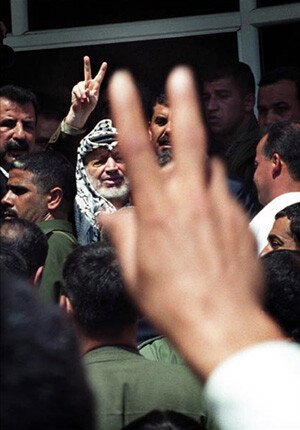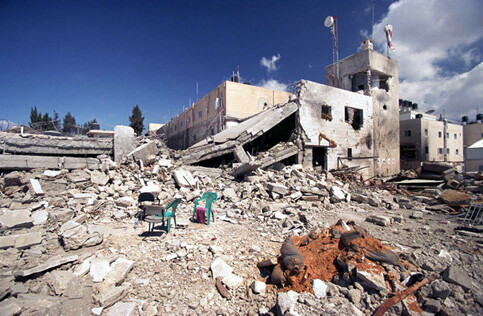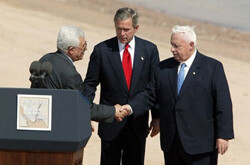The Electronic Intifada 16 July 2003

Arafat in June 2002 after inspecting the damage done to his Ramallah headquarters. The Muqata’ compound was reduced to rubble by the Israeli army. (Ronald de Hommel)
In interviews with British and Italian newspapers, Israel’s Prime Minister Ariel Sharon accused Arafat of undermining his own prime minister, Mahmoud Abbas. He also urged Europeans to boycott Arafat and to end all contacts with him, following the example of the United States, Israel and Italy.
Arafat has been confined to his shattered headquarters in Ramallah since Israel placed him under house arrest over fifteen months ago.
The UK government refused this request when Sharon pressed it during his recent visit to London. Yet, despite the fact that many European and other countries have refused to abide by Washington and Tel Aviv’s decree that Arafat is no longer the Palestinian leader, his real authority has been steadily declining. The appointment of Abbas, pushed by the Bush administration, was supposed to finish him off.
Both US Secretary of State Colin Powell and National Security Adviser Condoleezza Rice, during their recent visits to the region, not only avoided Arafat but travelled all the way to Jericho to meet Abbas, thereby avoiding even the city of Ramallah where Arafat is being held prisoner by the Israelis.

Arafat’s headquarters in Ramallah after being attacked by the Israeli Army in June 2002. (Ronald de Hommel)
Arafat was originally dropped because the Israelis claimed that he was behind the continuation of the Intifada and that he had not kept his promises to crush those among his people who insist that as long as there is foreign military occupation there must be resistance. But Arafat did, in fact, repeatedly condemn violence — in English and in Arabic — and called on his people to end resistance or violence in all its forms.
He even condemned some Palestinian groups as “terrorist” and pledged to pursue and dismantle them. Responding to Israeli and American demands, Arafat kept calling on his people to observe instant and unconditional ceasefires, ordering them to even refrain from firing in self-defence when attacked by the occupier. He continued to do that long after his security forces were virtually destroyed, many of their members murdered or arrested by their former Israeli colleagues. He did all this even after cruel atrocities, which provoked international outrage, were inflicted on his people by Israel, and even after Sharon declared that Palestinians should be killed in large numbers so that they understand Israel’s “message.”
None of this, not even the major concessions Arafat made within the framework of the Oslo accords, has been enough to spare him the wrath of the Americans and the Israelis whose reward to him was demonisation, humiliation and abandonment.
In the view of both the Americans and the Israelis, Arafat’s true crime is that he failed, in the final stage of the plot, to bless the deal they tailored for him, when he allegedly refused to sign up to “Barak’s generous offer” at Camp David in July 2000.
Abbas was chosen by the United States as an unelected, alternate Palestinian leader who could be bullied and bribed into doing what Arafat failed to do earlier. Abbas is now anxiously and willingly treading exactly the same path of surrender and obedience that Arafat trod before him. Except, in Abbas’ case, it will not take him as long to reach the same dead end in which Arafat finds himself.
Abbas has so far been unable to deliver on any of his commitments, such as ending the Intifada, dismantling the resistance groups, collecting their weapons and ending their existence. He has failed to enforce his recent claim that there is only one authority and only the weapons carried and authorised by that authority will be legal, and everything else would have to be brought under strict control. He has kept quiet in the face of defiant Hamas and other resistance groups, challenging declarations that they would not surrender one piece of their weapons or relinquish their right to resist the occupation until the occupation ends.

Armed members of the Al-Aqsa Martyrs’ Brigade parade in Gaza. (Ronald de Hommel)
All he managed to secure, with utmost difficulty, personal appeals and with substantial help from other neighbouring countries, is a limited, conditional ceasefire. The one positive element is that Palestinian groups agreed to stop attacks targeting Israeli civilians, without relinquishing the right to resist by force against the occupation itself. But the other conditions they attached to the ceasefire demonstrated that Abbas had to succumb to the reality that there is more than one authority, that Hamas and the other resistance groups were negotiating from a position of strength, and probably taking the initiative.

Palestinian Prime Minister Mahmoud Abbas, President George W. Bush and Israeli Prime Minister Ariel Sharon after reading statement to the press during the closing moments of the Red Sea Summit in Aqaba, Jordan Jun 4, 2003. (White House/Paul Morse)
Abbas’ meagre achievement, lack of credibility and unpopularity among the people he was imposed on are forcing Israel to look for an alternative explanation for the dramatic failure of their plan. The handy scapegoat is, as usual, Arafat, who is accused of undermining Abbas’ mission. Naturally, Israel’s refusal to implement any of the roadmap’s requirements, whether it is a freeze on settlements, the release of prisoners or an end to incitement and violence against Palestinians, is not thought to have anything to do with the crisis.
Abbas has been described as a weak leader by American and Israeli officials, and indeed he is. Throughout his long political career, any influence he had was derived from and dependent upon support from Arafat. It is ironic, therefore, that the Americans now think they can get anywhere by placing Abbas in a position where he is supposed to rival and challenge Arafat.
Even if Arafat does not take any steps to actively obstruct Abbas, and he has not, his mere presence makes Abbas’ position all but impossible. But his removal is by no means a better alternative.
Perhaps it is for this reason that the Israelis have been escalating their campaign against Arafat. They may truly believe that with Arafat out of the way, Abbas will transform himself into a strong leader. This is another fallacy which will be instantly disproved if the Israelis carry out their threats against Arafat. Abbas will simply be further weakened and his authority further challenged by people who have so far been restrained only by Arafat’s presence at the head of the Palestinian National Authority.
Hasan Abu Nimah is former Permanent Representative of Jordan at the United Nations and a former Jordanian ambassador. He is a regular contributor to EI.




